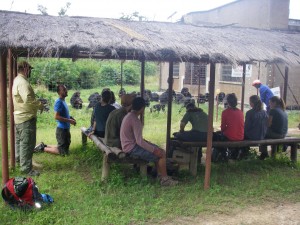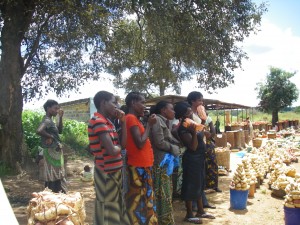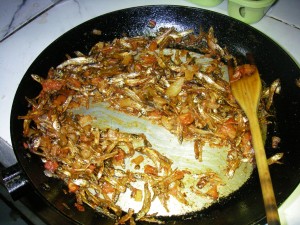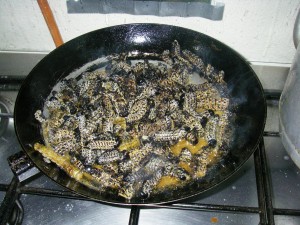Everyone has arrived safe and sound here in Zambia. The weather here has been rainier than usual. Zambia has t wo distinct seasons: (i) the rainy season from December through March where it rains every day, and (ii) the dry season from April through November during which it does not rain at all. This year however the rains are still falling and it is already April 11th. When it rains here it really pours (no drizzle)! There is no trash pickup here so the rain can wash things such as trash, human waste, and fertilizer into the streams and rivers. This can lead to eutrophication of the waterways. This means that a lot of the life in the streams and rivers can die and make the water unsafe for people to use.
wo distinct seasons: (i) the rainy season from December through March where it rains every day, and (ii) the dry season from April through November during which it does not rain at all. This year however the rains are still falling and it is already April 11th. When it rains here it really pours (no drizzle)! There is no trash pickup here so the rain can wash things such as trash, human waste, and fertilizer into the streams and rivers. This can lead to eutrophication of the waterways. This means that a lot of the life in the streams and rivers can die and make the water unsafe for people to use.
We have been looking at a lot of agriculture here in Zambia. We are trying to learn conservation agriculture….a way to farm that reduces (or ideally eliminates) the amount of fertilizer and pesticides a farmer need s to buy to raise crops. Fertilizers and pesticides can harm the environment it not used correctly and they are very expensive for the farmers here to buy. Instead we use manure and grass to make compost to fertilize the crops. We also learned that you can use different plants, such as garlic, as natural pesticides. The farmers here grow familiar crops such as cabbage, tomatoes, and carrots; but also ones you cannot grow in Colorado such as mangoes, bananas, and impwa (a kind of eggplant).
s to buy to raise crops. Fertilizers and pesticides can harm the environment it not used correctly and they are very expensive for the farmers here to buy. Instead we use manure and grass to make compost to fertilize the crops. We also learned that you can use different plants, such as garlic, as natural pesticides. The farmers here grow familiar crops such as cabbage, tomatoes, and carrots; but also ones you cannot grow in Colorado such as mangoes, bananas, and impwa (a kind of eggplant).
After learning about conservation farming techniques and visiting local farms we also went to an aquaculture farm. These farms raise fish instead of vegetables. They build large
square ponds and put baby fish in them. They feed the fish corn meal and even put manure in the water to fertilize the plankton (which the fish also eat). Once the fish are big enough they remove them and sell them to eat. Because of the manure, feed, and fish waste in the water, they have to be very careful with where they put the water when they are done. This water is very rich in nutrients and could cause algal blooms if released somewhere without removing the nutrients first using plants.
After all of this we went to another part of Zambia (Chingola). Here there a huge copper mines. Copper is dug out of a deep pit and sold to other countries. Copper is Zambia’s primary export. Because of the copper mining heavy metals leach out of the waste and into the Kafue River. These metals accumulate in the fish and make them less healthy for the people to eat. There has to be a balance between mining the copper (which Zambia needs) and keeping the rivers clean (which the people living around them need).
We also visited a chimpanzee orphanage named Chimfunshi. Hunters go out into the jungle and kill adult chimps to sell as meat (this is called bushmeat). People will pay more for chimp meat than beef because they like the taste. This is illegal because chimps are endangered. It can take 10 years for a chimp to grow from a baby into an adult. If hunters find baby chimps they will take them alive and sell them as pets (which is also illegal). Chimfunshi will take these chimps and let them live with other chimps inside large fenced-in areas. The chimps have plenty of room and are fed once per day. It is interesting to see the chimps playing with each other and jumping around. They seem so much like us sometimes! The males can get pretty angry if you get too close and they hop up and down and actually throw rocks and sticks through the fence at you! Chimfunshi is a pretty neat place.
I have gotten to eat some of my favorite foods here: fresh bananas, sweet potatoes, kapenta (small sardines), and even caterpillars! YUM!!!!



It looks like you get to eat some pretty interesting food there. Thanks for sharing your insights about sanitation, the impacts of fish farming on aquatic ecosystems and other environmental issues. Some of these things, like clean, safe water, we take for granted in the U.S. I look forward to your next post!
Sounds like you are having fun exploring many of the industries of Zambia. It sounds like a great class and an eye-opening experience! Reading about the water quality issues made me excited to look for research opportunities in the area. I hope you are not getting rained out and that you have a wonderful time trying the local cuisine!